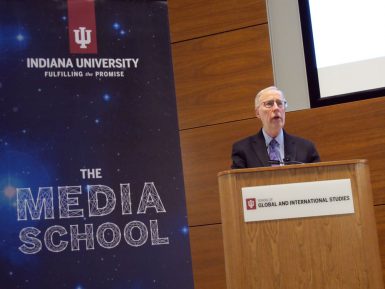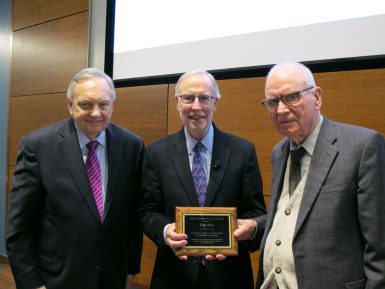Post’s Dan Balz: Geography, education, ideology led to political divide

When Washington Post chief correspondent Dan Balz met with IU president Michael McRobbie in Bryan Hall Tuesday before delivering a lecture as part of The Media School’s Speaker Series, he took note of IU’s motto: Lux et Veritas. Light and truth.
Balz has been involved in political coverage as a reporter or editor throughout his career, so he was struck by how relevant light and truth are to recent political coverage.
“There are great challenges to the legitimacy of fact-based journalism and fact-based discussion. This is a new phenomenon and one that I think has grown worse over the last couple of years,” Balz said. “We have a president that is at war with an institution, including the role of the press.”
Balz’s talk focused on how the United States became so politically divided in wake of the 2016 presidential election. After the lecture, he received the Lee H. Hamilton Fellowship in Public Service, presented by the longtime Indiana congressman.
“The representative democracy depends on citizens who make discriminating judgments about policies and politicians and politics,” Hamilton said. “We get the information upon which to make those judgments by people like Dan Balz here, and without them, representative democracy would collapse.”

While Donald Trump is the most polarizing president in history with only 7 percent of his opposing party’s approval, there has been a steady decrease in opposing party approval in recent history. Barack Obama is the second-most polarizing president and George W. Bush is the third.
Balz discussed how American voters have been sorted geographically, ideologically, culturally and educationally, and ultimately by partisanship. Even though independent voters are the fastest-growing group of voters, they still typically stay loyal to one side. A middle ideology is nearly gone.
“I think everyone does believe that the center of American politics is where action occurs, where compromise occurs,” Balz said. “If you need to get things done, that’s where you try to go, whether it’s within the congress or electorally, but the reality is that group barely exists at this point.”
Balz said there is a clear divide of politics based on education and geography. For instance, all of the states that have a higher percentage of citizens with advanced degrees than the national average voted Democrat in the 2016 presidential election.
Republicans statistically prefer to live in rural areas with larger houses further away from restaurants, schools and other amenities, while Democrats prefer urban areas with smaller houses within walking distance of such conveniences. This could explain why some Democrats say they don’t know people who voted for Donald Trump, and many people who live in smaller rural counties similarly live around people who share similar ideas.
Dan and Sharron Wiseman are IU alumni and recently moved back to Bloomington. They went to listen to Balz talk to learn more about political leanings outside of the “blue bubble” they consider Bloomington.
“I went in thinking civility and listening to people is a solution to polarization, but he made me realize we are divided geographically, structurally too,” Dan Wiseman said.
Sharron Wiseman agreed.
“I like how he brought up what Trump has caused, but also what was going on in our country that Trump walked into,” she said.
Differences in many factors led to a partisan split, Balz said. Gaps in thinking about how much power the government should have, immigration and global warming have increased significantly since 2002.
“There’s this notion of people sticking with their party — a sort of tribal sense of how and why people vote and exercise their views at the ballot box — that has become more and more rigid, more and more loyal,” he said.
People generally consume news from places that reinforce what they think, so as a result people disagree on all kinds of facts and what’s important. Balz said he was trained to believe the press should not be partisan and should be fair-minded.
“There is a sense that the press is partisan and people not only look to their own partisan labeling of the press for information, but they believe that anything that comes from elsewhere is, as Donald Trump says, fake news,” Balz said. “Some people have said just because you don’t like a story doesn’t mean it’s fake news.”
Political journalism is a charged environment right now, Balz said. Donald Trump did not create it, but he did intensify it. The question is what is next. Young people like those leading marches for gun control now are demonstrating a political leaning at a young age, but the youngest voters have the lowest turnout at the polls.
Balz said he believes women will likely drive the next election, and education will become an even stronger indication of political leaning.
And, he said, the press will remain devoted to what it always has been — the truth.

